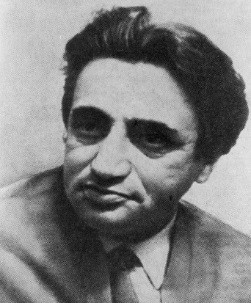
Natan Zabara
Natan Zabara was born in 1908 in the village of Rogachov, near Zhitomir (in northwestern Ukraine). In 1925 he moved to Kiev and enrolled in the Institute of Jewish Culture. In 1931 he was drafted for the first time into the Red Army. His experience of army service provided the topic gave for his first published novel (Radio-roman, 1932). By the time the Soviet-German war started in June 1941, he had published four novels and a collection of essays and literary sketches in Yiddish.
With the beginning of the war, Zabara was drafted for active service. He was sent to the front as a correspondent of the main Soviet Army newspaper Krasnaia Zvezda (Red Star), but also took part in combat as a junior officer. In 1943 Senior Lieutenant Zabara fought in the North Caucasus and then took part in the liberation of the Crimea and of Ukraine. He wrote also for the Moscow Yiddish newspaper Eynikayt. In 1943 he was wounded and spent a long time in a military hospital in Georgia (in the Caucasus). During his stay in the hospital, he conceived his masterwork, the novel "Galgal ha-khozeyr" (The Wheel of Eternity), that dealt with Jewish life in medieval Provence and Spain. The novel was published in the Soviet Union in Yiddish, but only in 1979, after the writer's death.
Zabara ended the war in Berlin. From 1945 to 1950, he continued his service, as a correspondent of the Soviet army's German-language newspaper Tägliche Rundschau. In 1951 he was arrested and charged with spreading "Jewish nationalist propaganda" and of having been in contacts with foreign intelligence services in Germany. As a result he was imprisoned in the Gulag for six years. According to recollections of his fellow-prisoners, at the risk of an extension of his prison-camp term, Zabara arranged Passover seders for the Jewish youth who were imprisoned with him. Thus, he introduced these young Jews to their national traditions and culture. Sitting at a table in a camp stockroom, he pronounced in Hebrew the words of the Passover Haggadah: "This year here, next year in the land of Israel. This year - slaves, in the future - free people."
In 1956 Zabara was released and returned to Kiev. He continued to write, but also became one of the first underground teachers of Hebrew in the city. After the Six-Day War (1967), he was contacted by the editorial board of Sovetish heymland magazine and asked to sign a letter condemning the "Israeli aggression". To this Zabara replied by paraphrasing a phrase from Psalm 137: "If I do this, let my hand wither ..." He does not appear to have been punished by the Soviets for this refusal.
Natan Zabara died in 1975 in Kiev. He had no family. The last wish he expressed to his friends was that his novel Galgal ha-khozeyr would be published in Hebrew in Israel.
From an article about Natan Zabara
From an article about Natan Zabara that was prepared by Faivl Sito for Eynikayt:
"The front-line soldier Zabara has dozens of documents, letters, and photographs taken by him in battle from German officers. All these documents reveal the fierce brutality directed by the Nazi villains toward innocent people. On the body of a German officer named Adam Hil (sic!) Zabara found a snapshot with the caption 'A Jew digging his own grave.' The photograph shows an old Jew holding a shovel, awaiting execution. He had dug his grave, and German officers were standing by, grinning and pleased with the amusement."






